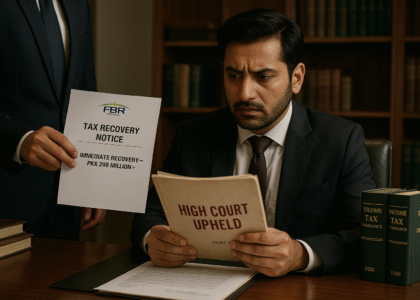Introduction: What is Excise Duty on Property?
The Excise Duty on Property under SRO 1376(I)/2024 is a tax levied on the transfer and allotment of immovable property in Pakistan. This notification, issued by the Federal Board of Revenue (FBR), introduces new rules for developers and builders who must collect the duty at the time of property transfer or allotment.
This blog will break down the definitions, procedures, and implications of excise duty on property transactions as per the latest regulations.
Key Definitions: Understanding the Terms
Before diving into the excise duty procedures, it’s important to understand key terms outlined in SRO 1376(I)/2024. These definitions clarify the scope of the excise duty and who is liable.
Developer: A person or entity engaged in developing land for residential or commercial plots and selling them. This includes:
- Housing societies
- Cooperative societies
- Development authorities
Builder: A person or organization engaged in constructing residential or commercial buildings for sale. Like developers, this includes housing and cooperative societies involved in construction activities.
Dutiable Property: Excisable property as listed in Table-III of the First Schedule to the Federal Excise Act, 2005.
Open Plot: Any immovable property without a superstructure.
Active Taxpayer List (ATL): A list maintained by the FBR of taxpayers who have filed their income tax returns by the due date.
Procedure for Collection of Excise Duty
The excise duty applies to property developers and builders at the time of the first allotment or transfer of property. Here’s a step-by-step procedure for collecting and paying excise duty:
Step 1: Collection of Duty by Developer or Builder
The developer or builder is responsible for collecting excise duty when transferring or allotting a commercial or residential property.
Duty Rates:
- 3% of the property’s gross value for buyers listed on the ATL on the date of acquisition.
- 5% for buyers who have missed the income tax filing deadline.
- 7% for buyers not listed on the ATL.
Step 2: Payment of Collected Duty
Once the excise duty is collected, the developer or builder must deposit the amount to the Federal Government using a Computerized Payment Receipt (CPR) or SWAPS Payment Receipt (SPR). This must be done on the same day of the transaction.
The receipt format is outlined in Form ‘A’ attached to the excise duty rules.
Step 3: Monthly Submission to Commissioner
Developers and builders must furnish a monthly statement to the Commissioner Inland Revenue in the prescribed format, Form ‘B’.
This statement details the excise duty collected during the month and ensures proper tracking by the tax authorities.
Penalties for Non-Compliance
Failure to collect and deposit excise duty can result in penalties:
If the developer or builder does not collect the duty, the Inland Revenue Officer can initiate proceedings to recover unpaid amounts.
A default surcharge is applicable on unpaid or short-paid duty, calculated from the due date of the duty until the payment is made.
Illustrative Example: Calculation of Excise Duty
Let’s assume a builder is selling a commercial property worth PKR 20 million. The excise duty rates will depend on the buyer’s tax status:
Buyer on ATL:
- Duty = 3% of PKR 20 million = PKR 600,000
Buyer not on ATL but filed taxes late:
- Duty = 5% of PKR 20 million = PKR 1,000,000
Non-filer Buyer:
- Duty = 7% of PKR 20 million = PKR 1,400,000
Impact of SRO 1376(I)/2024 on Stakeholders
This excise duty regulation has a significant impact on various stakeholders involved in property transactions:
For Developers and Builders
- Developers and builders must ensure timely collection and payment of excise duty to avoid penalties and surcharges.
- The monthly reporting requirement to the Commissioner adds an administrative burden.
For Property Buyers
- Buyers are encouraged to file their income tax returns on time to benefit from lower excise duty rates (3% instead of 5% or 7%).
- Non-filers or late filers face significantly higher costs when purchasing property.
For the Government
- The government stands to increase its tax revenues by enforcing excise duty on property transactions and ensuring compliance through penalties for non-payment.
Why Is Excise Duty on Property Important?
The primary goal of this excise duty is to broaden the tax base and ensure compliance with the Income Tax Ordinance, 2001. By linking duty rates to the taxpayer’s status on the ATL, the government incentivizes timely filing of income tax returns, discouraging tax evasion.
Moreover, the excise duty contributes to the government’s revenue from the booming real estate sector, a significant part of Pakistan’s economy.
Download original Notification
Or visit: FBR Direct






